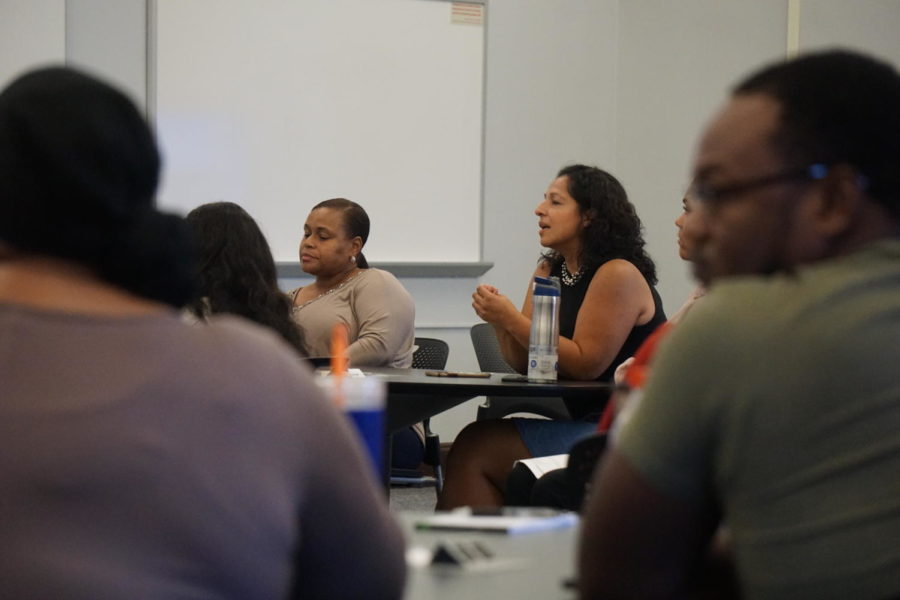‘Big or Small — Do You Call?’: Iowa State’s latest campus conversation talks police reporting
Megan Petzold/ Iowa State Daily
Members of the audience were given the option to ask questions during the Campus Conversations: Big or Small-Do You Call? lecture on Sept. 13.
September 13, 2018
A university presentation urged people to think whether they are reporting suspicious behavior based off a person’s actions or their physical features.
Thursday’s campus conversation, held at 3:30 p.m. at Parks Library, focused on the recent climate surrounding police reporting and call responses.
“Big or Small — Do You Call?” featured presentations from Iowa State Police Department (ISUPD) officers Anthony Greiter and Lt. Josh Hale, as well as Donielle McGruder, vice president of the NAACP student chapter and sophomore in psychology.
Hale introduced what they call “bias based improper reporting.”
“We’ll define it as calling the police on somebody based on their characteristics instead of their actions,” Hale said. “Ultimately if a person with different characteristics were doing the same action, would the police still be called?”
Hale gave examples of good and bad reporting from citizens.
Regarding improper reporting, they referred to the incident in a Starbucks in Philadelphia where police forced two business partners, who were both black men, to leave the building after management had called them.
They compared this to an incident in Clackamas, Oregon, where someone called the police on Rep. Janelle Bynum, who was in the process of completing a door to door campaign.
When police responded, they were able to facilitate a conversation between Bynum and the reporting party, who apologized.
Greiter said both of these situations did not require police response in the first place.
The officers also presented a video depicting a recent incident in Milwaukee that involved a false report. Police officers were told two black men were robbing an elderly woman in a car, when in reality the man was the woman’s grandson and were returning from a church service.
Various aspects of the situation were discussed, including the experience of the man who was cuffed, his body language, and Greiter and Hale explaining the police perspective on the incident.
This situation hit close to home for multicultural liaison officer for the College of Human Sciences, Carmen Flagge.
“I also shared about my son, who is thirteen and on the autism spectrum, who would not be able to follow any of the commands of a police officer if we were stopped, and so seeing the young man in that video really impacted my heart,” Flagge said.
McGruder spoke about the mission of the NAACP at Iowa State, emphasizing the importance of networking and communication.
McGruder also handed out a pamphlet from the National Black Police Association that gave attendees information on what they can do when stopped by the police as well as the rights they have.
The pamphlet details the best actions to take in different contexts when dealing with the police, such as being stopped in your car, on the street or having officers knock on your door.
Audience members broke into small groups and discussed the talking points of the presentation.
Attendees discussed solutions to poor police responses to biased improper reporting, how the content of the presentations made folks feel, the importance of accountability within law enforcement and being aware of the historical purpose of police forces within society.
During the discussion, major talking points and sentiments were recorded on post it notes, which were collected at the end of the discussion.
Liz Mendez-Shannon, project director in Hispanic/Latinx affairs in the Office of Diversity and Inclusion, said the notes were collected with the hope of being able to better listen to members of Iowa State’s community.
“These are our qualitative responses to what’s happening and the climate of our campus, and we utilize those responses to impact how we do our next initiatives across campus,” Mendez-Shannon said.







